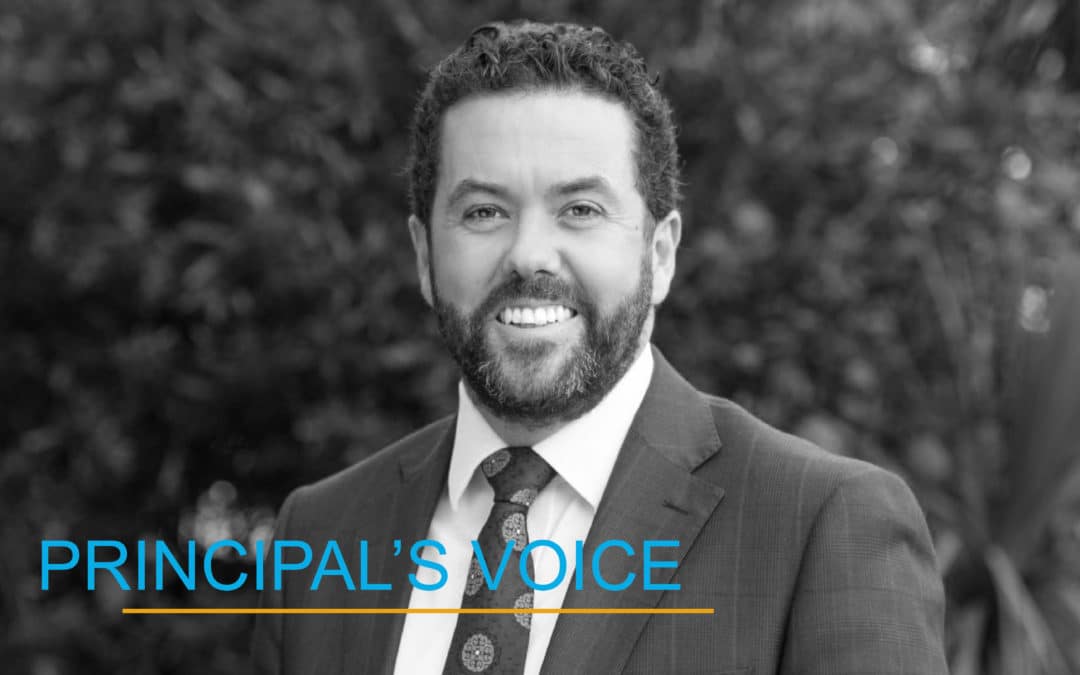By wisdom a house is built and through understanding it is established; through knowledge its rooms are filled with rare and beautiful treasures.
– Proverbs 24:4
“Education is simply the soul of a society as it passes from one generation to another.” – G.K. Chesterton
As always, it is a delight and privilege to see and hear students back at school after the break. Schools are meant to be full of people. Nonetheless, the change of pace of the term break does allow time for contemplation and reflection.
I wish Year 12 2020 all the very best as they head into the HSC next week. Through the holidays and during this week, they and their teachers have worked hard to put the final touches on their preparation for the coming exams. We are confident that our students have been well-taught and well-supported at home and at school, and will reap a reward in keeping with their efforts.
Year 12 2021 have kicked-off their HSC Year, and received their Year 12 jerseys as a tangible marker that they are now entering their final year of school, with all that it entails. It is oft-said, largely because it is true, that Year 12 is the hardest and best year of school life, with a sense of purpose and a closeness that comes from sharing such a formative experience.
Part of my reading in the term break included Stanislas Dehaene’s book How We Learn: Why Brains Learn Better Than Any Machine…for Now, published this year, and Daniel Willingham’s Why Don’t Students Like School?: A Cognitive Scientist Answers Questions About How the Mind Works and What It Means for the Classroom, published in 2009. Both authors work in the field of cognitive science, researching the brain and learning.
In Willingham’s book, he outlines nine principles that he argues are so fundamental to the mind’s operation that they do not change even as circumstances change. They are as below:
- People are naturally curious, but we are not naturally good thinkers; unless the cognitive conditions are right, we will avoid thinking.
Curiosity is easy, but thinking is hard, so we need to cultivate the right conditions to help us think – think Goldilocks – too easy, we switch off, too hard, likewise, thinking is cultivated when the level of challenge is “just right”.
- Factual knowledge must precede skill.
Thinking involves our working memory and our long-term memory. The more we have in our long-term memory, the more we can use our working memory without overburdening it. Think of factual knowledge as the raw materials that give our skills something to build with.
- Memory is a residue of thought.
We remember what we think about or pay careful attention to. Things that cause us to respond or react help us to create memories.
- We understand new things in the context of things we already know, and most of what we know is concrete.
Abstract ideas are hard to comprehend, examples help us to understand them. Deep knowledge emerges when we can connect new things to what we already know and make sense of the connection.
- It is virtually impossible to become proficient at a mental task without extended practice.
Practice is part of what helps us to head towards expertise and the ability to do things without thinking, which frees up space for more thinking and helps us to apply understanding in new contexts.
- Thinking early in training is different from thinking late in training.
It is a mistake to think that amateurs should think like experts. The path to expertise is practice, and often that involves breaking down tasks into components.
- Children are more alike than different in how they learn and think.
It is more important, and more fruitful, to focus on what is similar and shared for thinking and learning, than on what is different.
- Children do differ in intelligence, but intelligence can be changed through sustained hard work.
Intelligence is not fixed, and hard work pays off.
- Teaching, like any complex cognitive skill, must be practiced to be improved.
Teachers must be as willing, if not more willing than their students to keep learning.
Thinking is hard, as is learning, but then again, so is anything worthwhile. Our job remains to put in place the right conditions for our students to think, learn and grow.
Tim Watson
Principal





